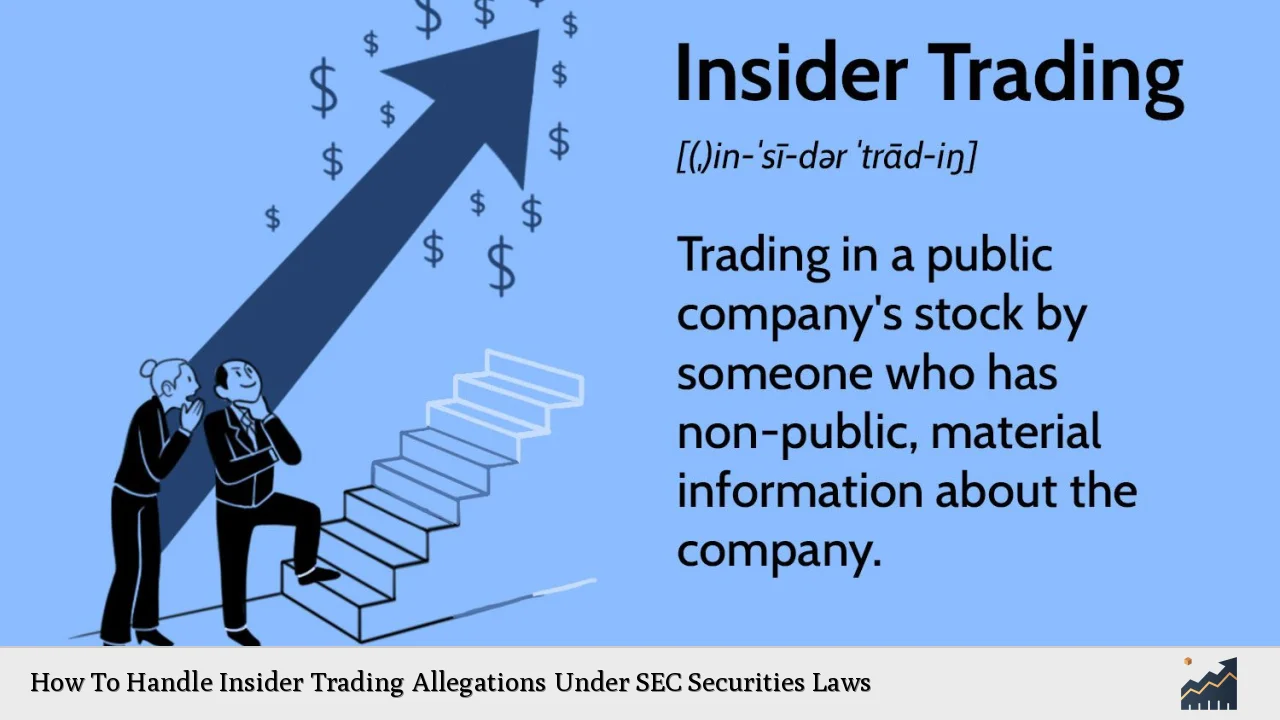Insider trading allegations pose significant risks for individuals and companies alike, often leading to severe legal consequences and reputational damage. Understanding how to navigate these allegations under SEC securities laws is crucial for anyone involved in the financial markets. This article explores the complexities of insider trading, the regulatory landscape, and effective strategies for addressing allegations.
| Key Concept | Description/Impact |
|---|---|
| Insider Trading Definition | Buying or selling a security based on material nonpublic information (MNPI), which violates fiduciary duties. |
| Legal vs. Illegal Insider Trading | Insider trading is legal when conducted under specific SEC regulations, such as reporting requirements and pre-established trading plans. |
| SEC Enforcement Actions | The SEC actively monitors and enforces insider trading laws, with significant penalties for violations, including fines and imprisonment. |
| Defensive Strategies | Employing legal defenses such as demonstrating the legality of trades or lack of MNPI can mitigate risks associated with allegations. |
| Shadow Trading | A new form of insider trading where MNPI from one company influences trading in another related company, with recent SEC actions highlighting this issue. |
Market Analysis and Trends
The landscape of insider trading enforcement has evolved significantly over the years. In fiscal year 2024, the SEC filed 583 enforcement actions, marking a 26% decline from the previous year but still indicating a robust commitment to maintaining market integrity. Notably, insider trading actions accounted for only 6% of total SEC actions, suggesting a strategic focus on more severe violations while still monitoring traditional insider trading cases closely.
Recent trends also highlight the emergence of “shadow trading,” where insiders trade based on MNPI from their company that could affect another company’s stock price. The SEC has begun to take action against this practice, indicating a broader interpretation of insider trading laws and an increased vigilance in enforcement efforts.
Implementation Strategies
Handling allegations of insider trading requires a proactive approach:
- Legal Representation: Engaging experienced legal counsel is essential for navigating the complexities of insider trading laws. An attorney can assess the specifics of the case and develop a robust defense strategy.
- Compliance Programs: Companies should implement comprehensive compliance programs that include training on insider trading laws and regular audits to ensure adherence to SEC regulations. This includes establishing clear policies regarding MNPI and reporting obligations.
- Pre-established Trading Plans: Utilizing Rule 10b5-1 plans allows insiders to trade without the risk of violating insider trading laws, provided these plans are established when they do not possess MNPI.
- Documentation: Maintaining thorough records of all trades and communications related to MNPI can serve as critical evidence in defending against allegations.
Risk Considerations
The risks associated with insider trading allegations are substantial:
- Legal Consequences: Violating insider trading laws can lead to significant fines (up to $5 million) and prison sentences (up to 20 years). Civil penalties may also include disgorgement of profits gained through illegal trades.
- Reputational Damage: Allegations can severely impact an individual’s or company’s reputation, affecting relationships with investors, clients, and regulatory bodies.
- Market Impact: Insider trading violations can lead to market instability, prompting increased scrutiny from regulators and potential changes in market dynamics.
Regulatory Aspects
The SEC is the primary regulatory body enforcing insider trading laws under the Securities Exchange Act of 1934. Key aspects include:
- Material Nonpublic Information (MNPI): The SEC defines MNPI as information that could significantly affect an investor’s decision-making process regarding securities.
- Reporting Requirements: Insiders must report their trades using Form 4 within two business days after executing a transaction. Failure to comply can result in additional penalties.
- Enforcement Mechanisms: The SEC employs various investigative tools, including market surveillance technology, to identify suspicious trading patterns and relationships among traders.
Future Outlook
As regulatory scrutiny intensifies, individuals and companies must remain vigilant about compliance with insider trading laws. The SEC’s recent focus on shadow trading suggests that enforcement will continue to evolve, potentially leading to new interpretations of existing laws.
Investors should be aware that even perceived improprieties can lead to investigations. Therefore, maintaining transparency and adhering strictly to compliance protocols is essential for mitigating risks associated with insider trading allegations.
Frequently Asked Questions About How To Handle Insider Trading Allegations Under SEC Securities Laws
- What constitutes insider trading?
Insider trading involves buying or selling securities based on material nonpublic information that violates fiduciary duties. - How can I defend against insider trading allegations?
Common defenses include proving that the information was not material or nonpublic or demonstrating compliance with Rule 10b5-1 pre-established trading plans. - What are the penalties for insider trading?
Punishments can include fines up to $5 million, imprisonment for up to 20 years, and civil sanctions such as disgorgement of profits. - What is shadow trading?
Shadow trading refers to using MNPI from one company to trade securities of another related company influenced by that information. - How does the SEC monitor insider trading?
The SEC utilizes sophisticated market surveillance technology to detect suspicious trades and investigate potential violations. - Are there legal ways for insiders to trade?
Yes, insiders can legally trade if they follow specific regulations set forth by the SEC, such as filing timely reports and adhering to established trading plans. - What should companies do if they suspect insider trading?
Companies should conduct internal investigations, consult legal counsel, and review compliance programs to address potential violations effectively. - Can I be charged with insider trading if I received a tip?
If you acted on material nonpublic information received from someone who had a duty not to disclose it, you could potentially face charges for tipping or misappropriation.
In conclusion, handling allegations of insider trading effectively requires a comprehensive understanding of securities laws, proactive compliance measures, and strategic legal defenses. By remaining informed about regulatory changes and implementing robust compliance programs, individuals and companies can mitigate risks associated with these serious allegations.

